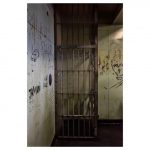Liz Floyd still fighting for Aggett
On the ‘close comrades’ list, it was only a matter of time before the apartheid police arrested and interrogated Neil Aggett, and his partner Liz Floyd. She is still fighting for justice for Aggett…
Author:
24 January 2020

When Elizabeth Floyd met Neil Aggett at the University of Cape Town in 1974, she was a third-year medical student and Aggett was a year ahead of her. Testifying at the reopened inquest into Aggett’s death in the Johannesburg high court on Thursday 23 January, Floyd recalled that the young man she became romantically involved with was interested in philosophy, particularly the work of German and French philosophers and that of Albert Camus and Frantz Fanon.
While he was not yet politically involved, Floyd said that Aggett was concerned about South African politics and planned to leave the country after graduating to avoid being conscripted into the South African military. He was opposed to the National Party and “refused to fight against fellow South Africans”.
The Aggett family had once had a farm in Africa, on the slopes of Mount Kenya, where Aggett and his older siblings Jill and Michael were raised in the comforts that accompanied the white settler lifestyle of the last days of the British Empire.
Related article:
As a teenager, after leaving Kenya and settling in South Africa, Aggett had read of the exploits of Dedan Kimathi, the leader of the freedom fighters the British called ‘Mau Mau’ who led an unsuccessful uprising against the colonial government and was executed in 1957. Floyd did not detail what effect the story of Kimathi had on the young Aggett, except to say that it had caused a rift between him and his father Aubrey. It was evident, however, that Aggett’s young political consciousness had been awakened and so when Floyd visited him during his internship at Tembisa Hospital in 1977, the two began to become involved in political work, he as an organiser for the trade union movement and she for the Industrial Aid Society.
Floyd told the court that while she and Aggett “were ANC sympathisers and supporters”, they were not members of the banned organisation. They chose to work for public organisations rather than taking orders from an outside organisation. As their work brought them into increasing contact with union and anti-apartheid activists, the couple found themselves the subject of scrutiny from members of the Security Branch.
Police harassment
In 1981, the year of his arrest, Floyd recalled that the Security Branch “regularly followed Neil with several cars when he left the house and parked outside the house [in Fox Street, Malvern, where the couple lived] on many nights”. The Security Branch would also tamper with the tyres of the couple’s car and raided the union offices where Aggett was working several times. One of the officers urinated in a kettle on one occasion in a juvenile but effective reminder of the branch’s disdain for those who opposed the regime. The Security Branch followed Floyd as well and once tried to drive her off the road. But while she and Aggett could feel the increasing intensity of the pressure the police were placing on them, “we were unable to predict their next steps”.
The next step eventually came in the form of the arrest of Aggett’s close friend and comrade Gavin Andersson. He was one of the various people the couple knew who was taken into detention in September 1981, as part of a raid arising out of the surveillance of Barbara Hogan and her communications with the ANC in Botswana. Hogan had handed over a list of close comrades to someone she believed was a member of the ANC in exile, but who was in fact working for the security forces.
Related article:
On his release from detention in October, Andersson told Aggett that his and Floyd’s names were on the “close comrades” list and that they should expect imminent arrest by the Security Branch. Aggett and Floyd had one, long and ultimately final conversation together at a friend’s house in Crown Mines before their arrest at dawn on 27 November 1981. Floyd was taken to the Bronkhorstspruit Police Station, from where she would often be brought to John Vorster Square for interrogation over the course of the following months. She would not see Aggett alive again.
Discrepancies
Floyd recalled that after hearing of Aggett’s death, she was removed from detention and admitted to the Johannesburg General Hospital, where she was placed under the care of a psychiatrist and diagnosed with post-traumatic stress disorder (PTSD). She would remain there for seven weeks and was denied permission to attend Aggett’s funeral, although she insisted on being allowed to see his body because she “needed to understand that he had died”.
Related article:
Floyd made drawings of what she saw on the slab at the mortuary two days before Aggett was buried, noticing that “there were no visible marks on his neck”. She told the court that the kikoi from which Aggett’s body was shown hanging in photographs presented at the first inquest was not the one she remembered having been given to him by his friend Yvette Breytenbach before his death and handed to him during a visit while he was in detention.
It remains to be seen to what extent these and other observations made by Floyd will be used by Aggett’s lawyers during the remainder of the inquest. But they do raise questions that will need to be addressed during forensic and other expert witness testimony over the coming weeks.
Long-term effects
Floyd spoke of the effects that the PTSD she experienced as a result of her detention had on her subsequent day-to-day life. She had problems concentrating and experienced difficulties with her short-term memory. She had to relearn how to read and write, and was no longer possessed of the photographic memory that had served her so well in her student days.
Today, she still has trouble remembering new names and numbers. But she went on to obtain further university degrees and work extensively with other detainees, to help them deal with the symptoms of PTSD that they suffered as a result of their experiences.
Recently retired after her extensive post-1994 work in the Aids sector, Floyd has been involved in helping the family prepare for the reopening of the inquest into Aggett’s death since 2017. She told the court that “the political interference that stopped hundreds of murder and torture cases from the apartheid era from going forward cries out for a comprehensive commission of inquiry. It is astonishing that to date no inquiry has taken place, even though the families and the former TRC [Truth and Reconciliation Commission] commissioners have repeatedly called for one.”
She concluded giving evidence with an appeal that “so long as the state continues to protect perpetrators at the expense of victims, the project of reconciliation will remain incomplete. We must never forget the ultimate sacrifices made by people like Neil for our freedom, and we should always remember that ‘freedom’ is not ‘free’.”



